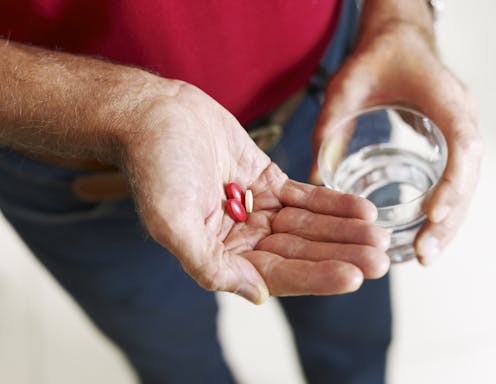Lying down, sitting, leaning over? What science says about the best way to take your medicine
- Written by Elise Schubert, Pharmacist and PhD Candidate, University of Sydney

When pharmacists dispense tablets or capsules they commonly advise when and how often to take them, and if this needs to be with or without food.
You generally don’t hear them tell you to lean to one side when swallowing. But preliminary research from Johns Hopkins University in the United States suggests this might improve how fast your medicine is absorbed and gets to work.
The results are based on a computer simulation, rather than in actual patients, and may not equate to the real world. So it’s too early to suggest you strike a yoga pose when taking your medicine.
But your posture can be important when taking pills or capsules, for comfort or safety.
Read more: What time of day should I take my medicine?
What happens when you swallow your medicine?
Once you swallow a tablet or capsule, it moves down the throat to the stomach. There, a tablet swells and disintegrates, or a capsule breaks open. The drug can then dissolve and your body can absorb it.
Most drugs do not start being absorbed until they reach the small intestine. However, some drugs, such as aspirin, are likely to be absorbed in the stomach because of its acidic environment.
A number of other factors can also affect where and how a drug is absorbed.
These include how fast the tablet disintegrates to release the drug, how fast the swallowed contents move from the stomach to the small intestine, the amount of food and drink consumed before taking the medicine, and how easily the drug is absorbed across the gut lining.
How about this latest study?
The US researchers used computer simulations to investigate how posture affects how drugs are absorbed.
The researchers used software they developed to simulate several ways of taking a pill: staying upright, leaning to the left or right, or leaning backwards.
They showed leaning 45 degrees to the right favoured a faster movement of stomach contents into the duodenum (the first part of the small intestine). This would allow the pill to be absorbed more quickly and start to take effect.
The results could be important for medicines that you’d want to act quickly, such as pain medicines, or ones used to treat a heart attack.
There is already some earlier evidence from real patients suggesting posture may influence how medicines are absorbed. This includes the option of leaning to the right. But the authors acknowledge many factors influence absorption, not just posture.
Read more: Health Check: is it OK to chew or crush your medicine?
When is it best to sit or stand?
Sometimes your pharmacist may advise you to swallow your medicine sitting, standing, or lying down for reasons other than speeding up absorption.
For example, certain drugs are more likely to cause side effects such as heartburn, where stomach acid leaks from the stomach and moves up into the oesophagus (food pipe).
These include non-steroidal anti-inflammatory drugs, such as ibuprofen (Nurofen), diclofenac (Voltaren), and iron supplements.
So if this is a problem for you, it may help to take these medicines sitting or standing, and not lying down straight away afterwards. That’s because your stomach acid is less likely to leak back up into your oesophagus.
Some medicines can irritate the throat if they become stuck. This is because they damage the protective mucosal barrier that lines your oesophagus and stomach, causing irritation and inflammation.
For these medicines it is important to take these sitting up or standing, and remaining upright for 30 minutes afterwards.
These include the antibiotic doxycycline, and drugs known as bisphosphonates (for osteoporosis), such as risedronate (Actonel) and alendronate (Fosamax).
Read more: Why older people get osteoporosis and have falls
How about lying down?
Glyceryl trinitrate (Nitrolingual) is an under-the-tongue spray. It’s prescribed to people with angina, a type of chest pain caused by an underlying heart problem.
Pharmacists advise patients to sit or lie down before using this spray as it can cause a sudden drop in blood pressure, making you feel very dizzy.
Other heart medicines, such as diuretics, are also known to cause dizziness. Although you don’t usually need to take these medications lying down, if you do become dizzy it is best to sit or lie down, and ensure you stand up slowly afterwards.
There are also medications that can cause drowsiness or make you feel “woozy”. These can include strong pain killers (such as opiates), sleeping tablets, some epilepsy medications, or drugs for certain mental health conditions, such as anxiety or schizophrenia.
These don’t need to be swallowed while lying down, but lying down can help if you become dizzy or drowsy.
What if I’m not sure?
Next time your pharmacist dispenses your medicine, unless they provide specific guidance about sitting, standing or lying down, you are generally safe to take it whichever way is most comfortable.
So how about this latest evidence suggesting leaning to the right might help? At this stage, you likely won’t hear your doctor or pharmacist recommend you should lean over to take your medicines until further research is done.
But next time you need to take a medicine for pain, as long as it is not uncomfortable, feel free to try this to see if your pain is relieved faster.
Authors: Elise Schubert, Pharmacist and PhD Candidate, University of Sydney



















